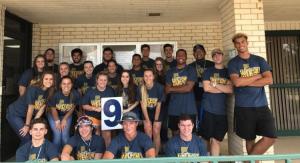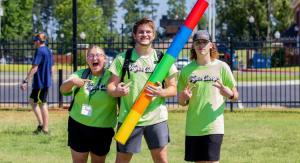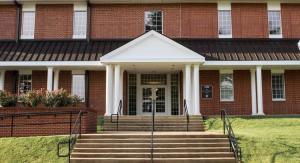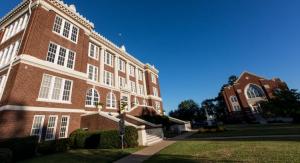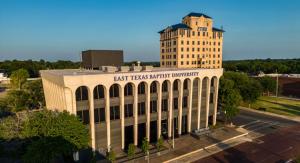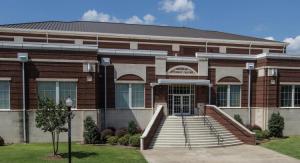These safety tips and guidelines are presented for information only and are not all inclusive.
They are intended to minimize the potential danger, damage, and disruption for students, faculty, staff, and guests of the University during an emergency. Individuals should make their own judgments and assessments as the circumstances warrant.
A printable copy of the Campus Emergency Plans can be accessed here.
- Important Phone Numbers
-
University Departments Campus Off-Campus University Security 2323 903.923.2323 Office of Student Engagement 2320 903.923.2320 Physical Operations/Maintenance 2098 903.923.2098 Counseling Services 2360 903.923.2360 Marketing and Communication 2374 903.923.2374 Residence Life: Carlile Hall 2369 903.927.2369 Fry Hall 4462 903.927.4462 Linebery Hall 2320 903.923.2320 Mabee Housing Complex 4491 903.927.4491 Ornelas Residential Center 8400 903.927.8400 University Apartments 2353 903.923.2353 University Park Row Houses 2321 903.923.2321 Emergency Services Off-Campus Emergency (Police-Fire-EMS) 911 Marshall Police Department 903.935.4575 Marshall Fire Department (Station #1) 903.935.4580 CHRISTUS Good Shepherd Hospital - Marshall 903.927.6000 CHRISTUS Good Shepherd Hospital - Longview 903.315.2000 Longview Regional Hospital - Longview 903.758.1818 Healthcare Express - Marshall 903.938.4363 IN CASE OF EMERGENCY: DIAL 911 UNIVERSITY SECURITY: 903.923.2323 - Fire or Fire Alarm
-
- Remain calm and encourage others to do the same.
- Activate the nearest fire alarm and alert those around you.
- Report a fire by calling 911 or contact University Security at 903.923.2323.
- Exit the area, turning off lights and shutting doors behind you.
- Do not use elevators.
- Evacuate the building through nearest exit and move at least 200 feet away from the structure.
- Report injuries by calling 911 and University Security at 903.923.2323. Refer to the INJURY tab.
- Do not return to the building unless authorized by fire or police personnel.
- Tornado/Severe Weather
-
- Remain calm and encourage others to do the same.
- Listen for city or campus tornado sirens or other warnings, monitor weather conditions.
- Move to designated tornado shelter area in the building.
- If unable to get to shelter area, move to an interior room without windows on the lowest level of the building and take cover.
- Stay away from doors and windows.
- Avoid auditoriums, gyms, lecture halls, labs, and HAZMAT storage areas.
- Do not go outdoors to get to a shelter.
- Remain sheltered until given the all-clear.
- Report injuries by calling 911 and University Security at 903.923.2323. Refer to the INJURY tab.
- Medical Emergency or Injury
-
- Remain calm and encourage others to do the same.
- If the injury appears to be serious or if the injured person requests it, call 911 immediately.
- Do not attempt to move a person who has fallen or appears to be in pain.
- Calmly reassure the ill or injured person.
- If properly trained persons choose to administer first-aid for minor injuries, ensure proper procedures are followed.
- For serious injuries, check breathing and give artificial respiration if necessary.*
- Control serious bleeding by direct pressure on the wound.*
- Continue to assist the victim until help arrives.*
- AEDs are located throughout campus.
- Notify University Security at 903.923.2323, advising of the Incident.
*Note: Only qualified trained personnel should provide first aid treatment (e.g., first aid, CPR, AED).
- Active Shooter
-
AVOID starts with your state of mind.
- Pay attention to your surroundings.
- Have an exit plan.
- Move away from the threat as quickly as possible.
- The more distance and barriers between you and the threat, the better.
DENY when getting away is difficult or maybe impossible.
- Keep distance between you and the threat.
- Create barriers to prevent or slow down a threat from getting to you.
- Turn the lights off.
- Remain out of sight and quiet by hiding behind large objects and silencing your phone.
DEFEND because you have the right to protect yourself.
- If you cannot AVOID or DENY be prepared to DEFEND yourself.
- Be aggressive and committed to your actions.
- Do not fight fairly. THIS IS ABOUT SURVIVAL.
- Call 911 when you are in a safe area, and inform the operator that this is an active shooter situation.
- When law enforcement arrives show your hands and follow commands.
- Suspicious Person or Item
-
- Do not threaten, intimidate, or physically confront the person.
- Do not let anyone into a locked building or room.
- Do not block the person’s access to an exit.
- If a person asks to speak to a specific University official, ask them to be seated and move outside the person’s hearing range to call 911.
- Call 911 as soon as you can safely do so.
- Call University Security at 903.923.2323 when possible.
- Make mental notes of descriptive characteristics of the person. (gender, race, height, weight, build, clothing, hair color/length, eye color, facial hair, tattoos, piercings, speech pattern, accent, dialect, and other markings or distinctions).
If you encounter a SUSPICIOUS ITEM or PACKAGE:
- Do not touch or move the item and move away from the area.
- Call 911 from a landline telephone or call University Security at 903.923.2323.
- Secure access to the area for the safety of others.
- Avoid interaction with others if you come in direct contact with a suspicious substance.
- The following indicators may identify a threat: no return mailing address, odd smell, leakage or seepage, liquid powder, unidentified substance from an unknown source, or strange sounds (ticking, beeping, etc.).
- Psychological Crisis / Suicide Threat
-
- A psychological crisis exists when someone is threatening harm to themselves or others or is out of touch with reality. The crisis may be manifested as paranoia, hallucinations, delusions, uncontrollable behavior, and/or complete withdrawal.
- If you come into contact with someone experiencing a psychological crisis that appears to be potentially dangerous (individual is unduly aggressive, hostile, has a weapon, or otherwise unmanageable) do NOT attempt to handle the situation alone.
- Call 911 and then call University Security at 903.923.2323.
- The safety of the person in crisis, yourself, and individuals in the surrounding area are of utmost importance.
- If a student is contemplating suicide:
- Remain calm and encourage others to do the same.
- Try to provide a safe, quiet, secure place for the individual.
- Maintain a straightforward, supportive attitude..
- Remind them they are not alone.
- Do not moralize or minimize concerns.
- If the threat is immediate or imminent, call 911.
- If the person needs counseling assistance, call University Security at 903.923.2323 or Counseling Services at 903.923.2360.
- Bomb Threat
-
- Remain calm and encourage others to do the same.
- If you observe a suspicious object or potential bomb on campus, DO NOT HANDLE THE OBJECT!
- Clear the area and call 911 from a landline telephone. Do not use cell phones or radios.
- If you receive a phone call indicating a bomb threat, ask the caller the following questions and document their answers:
1. When is the bomb going to explode?
2. Where is the bomb located?
3. What kind of bomb is it?
4. What does it look like?
5. Why did you place the bomb?- Talk to the caller as long as possible and document the following:
1. Time of call.
2. Age and gender of the caller.
3. Speech pattern, accent, and dialect of the caller.
4. The emotional state of the caller.
5. Background noise.- Law enforcement will conduct a cursory bomb search.
- While evacuating, employees, students, and guests should make a visual inspection of their area for suspicious objects and report the location to law enforcement. DO NOT HANDLE THE OBJECT!
- If an emergency exists, activate the building fire alarm and follow evacuation procedures.
- HAZMAT / Chemical Release
-
- Remove yourself from the area, and keep others away.
- Do not walk into, touch, or smell any of the spilled substance.
- Try not to inhale gases, fumes, or smoke.
- If possible, cover mouth with a cloth while leaving the area.
- Stay away from any accident victims until the hazardous material has been identified.
- Try to stay uphill and upwind of the accident.
- Call University Security at 903.923.2323 and state your name, location, and information about the spill (area involved, injuries, type of chemicals, amount).
- University Security will notify the Marshall Fire Department, Physical Operations, and any other needed resources.
- ALWAYS BE FAMILIAR WITH ANY CHEMICALS YOU ARE WORKING WITH.
- If you have been exposed to a chemical, refer to the available Material Safety Data Sheet (MSDS) for that chemical or chemical compound. Go to Health Hazard Data Selection, usually on the first page. This should include first aid information.
- MSDS copies are maintained in the Physical Operations Office.
FOR A POISON EMERGENCY CALL:
1.800.222.1222 - Blood, Body Fluid, Infectious Agents
-
An exposure refers to a specific eye, mouth, or other mucous membrane, non-intact skin or contact exposure with blood or other potentially infectious materials.
IF YOU ARE EXPOSED:
- Immediately WASH area with antibacterial soap and running water for 15 minutes.
- Flush mouth, nose, or eyes for 15 minutes with running water
- NOTIFY your supervisor.
- REPORT the incident to University Security at 903.923.2323.
- REQUEST blood testing and Hepatitis B vaccination.
UNIVERSAL PRECAUTIONS
Minimize your exposure by wearing gloves, splash goggles, packet mouth-to-mouth resuscitation masks (for CPR), or other barrier devices.RESPOND TO BLOOD/BODILY FLUID SPILLS (trained personnel only)
- Wear appropriate Personal Protective Equipment (PPE).
- Carefully cover the spill with an absorbent material, such as paper towels, to prevent splashing.
- Decontaminate the area of the spill using an appropriate disinfectant. When pouring disinfectant over the area always pour gently and work from the edge of the spill towards the center to prevent the contamination from spreading out.
- Wait 10 minutes to ensure adequate decontamination, and then carefully wipe up the spilled material.
- Disinfect all mops and cleaning tools after the job is done
- Dispose of all contaminated materials appropriately.
- Wash your hands thoroughly with soap and water immediately after the clean-up is complete.
- Utility Failures
-
- In the event of a major utility failure, immediately notify University Security at 903.923.2323 and/or Physical Operations at 903.923.2098.
- If an emergency exists, activate the building alarm (fire alarm) and evacuate the building.
- Move cautiously to a lighted area.
If your area experiences FLOODING:
- Stop using all electrical equipment.
- Call University Security at 903.923.2323 and/or Physical Operations at 903.923.2098.
If your area experiences a GAS LEAK:
- Cease all operations. Do not switch lights or any electrical equipment on or off. Remember, electrical arcing can trigger an explosion!
- Notify others in your area and evacuate the building.
- Do not smoke.
- Call University Security at 903.923.2323 and/or Physical Operations at 903.923.2098.
If your area experiences a VENTILATION problem:
- If smoke or noxious odors come from the ventilation system, immediately call University Security at 903.923.2323 and/or Physical Operations at 903.923.2098. If necessary, cease all operations and vacate the area.
If someone is caught in a STUCK ELEVATOR:
- Use the emergency phone that rings directly to University Security. Stay calm and understand that elevators have a “fail-safe” condition - the elevator cannot go into free fall.
- Call University Security at 903.923.2323.
- Do not try to open elevator doors or climb out.
- If the health of elevator occupants becomes an issue, call 911.
- Criminal/Civil Disturbance/Hostage
-
- If you are a victim or a witness to any on-campus offense or observe a criminal act or suspicious person on campus, call 911 or University Security at 903.923.2323.
- Note details and supply the dispatcher with any helpful information.
- Everyone can help make the campus a safe place by promptly reporting suspicious or criminal activity.
If a CIVIL DISTURBANCE or RIOT is in progress:
- Keep a safe distance from any crowd activities that appear unsafe.
- Secure your area - lock doors and windows.
- Avoid confrontation with crowd participants.
- If police are not already present, call 911 or University Security at 903.923.2323 and report details of the event.
If you are involved in a HOSTAGE SITUATION:
- Remain calm and be patient. Time is on your side. Avoid drastic action.
- The initial 45 minutes are the most dangerous. Follow instructions, be alert, and stay alive. Assume the captor is emotionally unstable. Don’t make mistakes that could potentially harm your well-being.
- Don’t speak unless spoken to and only when necessary. Don’t talk down to the captor, who may be in an agitated state. Avoid appearing hostile. Maintain eye contact with the captor at all times if possible, but do not stare. Treat the captor as a person in authority.
- Try to rest. Avoid speculating. Comply with instructions the best you can. Avoid arguments. Expect the unexpected.
- Displaying a certain amount of fear can possibly work to your advantage. Be observant. When you are released, or when you escape, the personal safety of others may depend on what you remember about the situation.
- Be prepared to speak with the police via phone. Be patient, and attempt to establish rapport with the captor.
- If medications, first aid, or restroom privileges are needed by anyone, tell the captor.
- Make mental notes of descriptive characteristics of the person (gender, race, height, weight, build, clothing, hair color/length, eye color, facial hair, tattoos, piercings, speech pattern, accent, dialect, and other markings or distinctions).
- Notifications and General Procedures
-
OUTDOOR WARNING SYSTEM: Harrison County may activate outdoor warning systems with siren alerts in the event of an emergency, which may be heard campus-wide by persons outside of buildings.
TEXT MESSAGES (Tiger Alert): Students, faculty, and staff are registered for Tiger Alerts (Emergency Mass Alert System) and receive SMS messages on their registered mobile phones when this system is activated.
EMAIL: Students, faculty, and staff will receive an e-mail message sent to their official ETBU e-mail address.
UNIVERSITY WEBSITE: The University Web site will be updated with information and instructions during an emergency situation.
PERSON-TO-PERSON COMMUNICATION (DSLs): The University’s Departmental Safety Representatives will deliver instructions to persons in their designated buildings/departments.If you are instructed to SHELTER-IN-PLACE:
- Close and lock all doors and windows.
- Move to a safe area.
- Instructors should verify class attendance and keep classes together.
- Remain sheltered until authorities give an all-clear notification.
- Monitor the ETBU Web site, text messages, etc., if possible.
- Do NOT call 911 unless you are reporting an active shooter, a life-threatening situation, personal injuries, smoke, fire, or gas odor.
If you are instructed to EVACUATE:
- In an orderly manner, leave the room and move toward the nearest exit. Close the door as you leave (do NOT lock).
- Do not operate electrical switches, and do not use cell phones, radios, electronic devices, etc.
- If time permits, turn off and unplug computers and all other electrical devices.
- When outside, move away from the building toward parking lots.
- Instructors or appointed leaders should verify class attendance and keep the class together.
- Remain outside buildings until law enforcement or University authorities give an all-clear notification.
- Assisting People with Disabilities
-
- If you are a person (employee or student) with a disability who may need assistance during a crisis, it is strongly recommended to establish a system now that assures you get the help you need. Work with the Disability Support Services in the Student Engagement Office at 903.923.2320 to develop an individual plan for how you will handle various types of emergency situations.
- In an emergency situation, if an individual wants to help a person with a disability, always ASK how you can help BEFORE giving assistance. Ask how he or she can best be assisted or moved, and inquire whether there are any special considerations or items that need to come with the person.
- DO NOT use elevators, unless authorized to do so by emergency personnel. Never use elevators if there is a fire or structural damage to the building.
- While it is best to follow the individual’s emergency plan, in the event of an imminent life-threatening situation, no one should hesitate to assist a person with a disability to evacuate a building, using whatever means possible.
ASSISTING PEOPLE WITH DISABILITIES
- People who are Mobility Impaired (those who use a wheelchair). When the alarm is activated, people using wheelchairs should either stay in place or move to a safe place and wait for assistance from a member of the University staff or other trained emergency personnel.
- People who are Mobility Impaired (those who do not use a wheelchair). People with mobility impairments who are able to walk independently may be able to negotiate stairs in an emergency with minor assistance. In an actual evacuation, these individuals may choose to wait until heavy traffic has cleared before attempting the stairs. Elevators can be used only if authorized by emergency personnel, but may never be used in the event of a fire or structural damage.
- People who are Deaf or Hard of Hearing. Most areas and rooms in University buildings are equipped with fire horns and strobe lights that simultaneously sound an alarm (auditory) and flash strobe lights (visual). Although this system is intended to alert deaf and hard of hearing individuals, they may not notice or hear emergency alarms and may need to be alerted to emergency situations.
- People with Sight Disability. People with sight disabilities are generally familiar with their immediate surroundings and frequently traveled routes. Nevertheless, because the emergency evacuation route might be different from commonly traveled routes, people who have a sight disability should be assisted when exiting the building.



